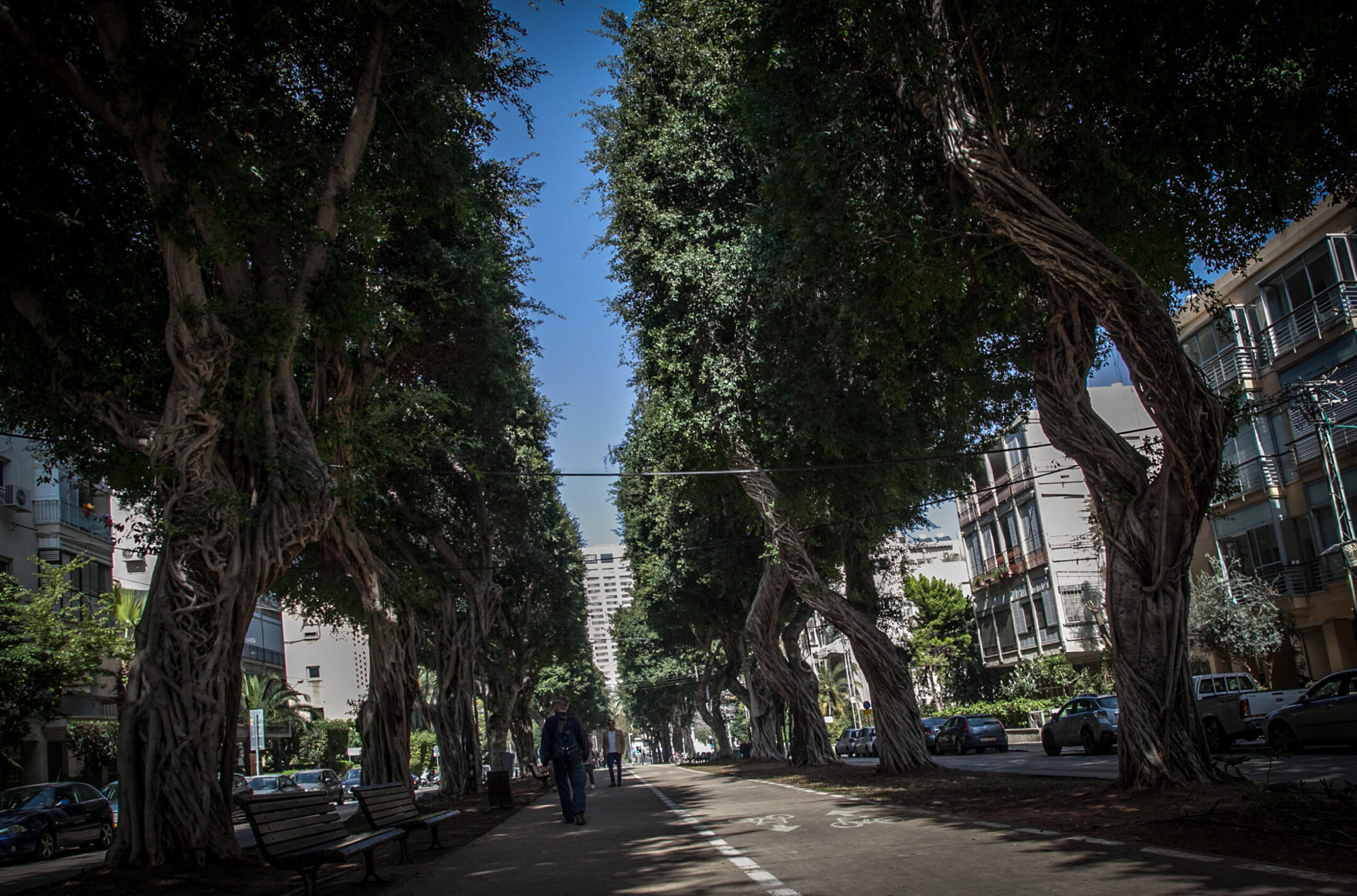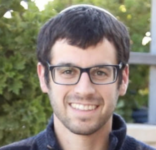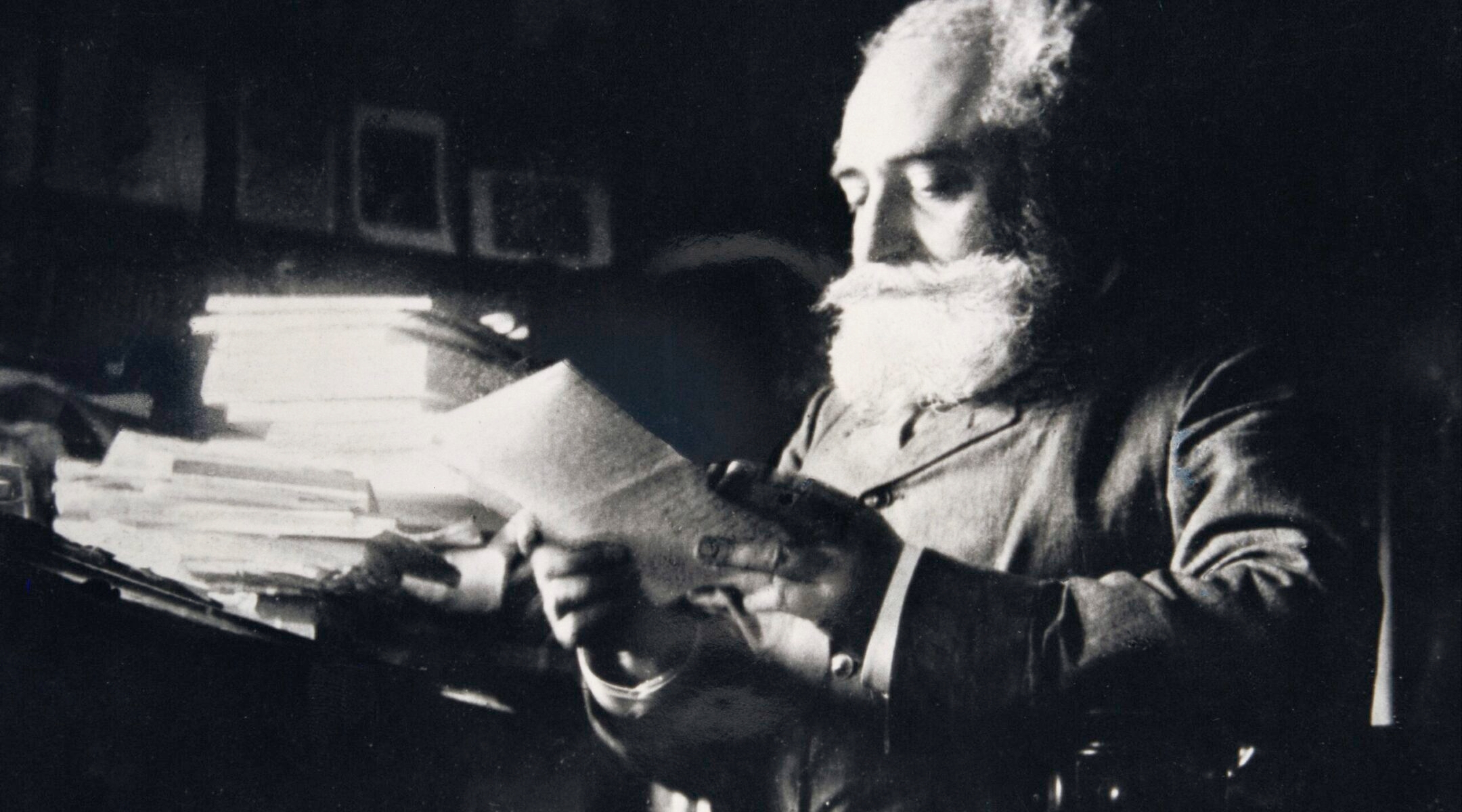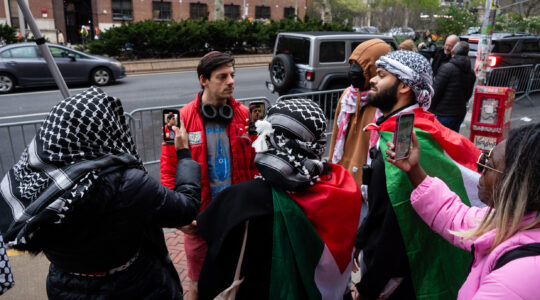(JTA) — In the weeks since Israel’s latest government was sworn in, questions relating to assimilation, defining Jewish identity and what it means to be a Zionist have been central to the public and political discourse, which in some ways is perhaps more heated and divisive than it has ever been.
One useful addition to the discourse might be recalling the thought and example of an author and Zionist leader who died 100 years ago last month. Max Nordau was a central figure in the early years of the modern political Zionist movement, literally founding the Zionist Organization (today’s World Zionist Organization) with Theodor Herzl and heading multiple Zionist congresses. A physician and renowned man of letters prior to his “conversion” to Zionism following the Dreyfus Affair in France, Nordau’s joining the Zionist movement gave it a notable boost in terms of renown and respectability.
He also coined the term “Muscular Judaism” — a redefinition of what it meant to be a Jew in the modern world; a critical shift away from the traditionally insular, “meek” Jewish archetype devoted solely to religious and intellectual pursuits. The “Muscular Jew” in theory and practice was necessary in order for a modern Jewish state to be established.
Reviving interest in Nordau now is a continuation of a conversation that an Israeli historian kicked off four decades ago. The historian, Yosef Nedava, embarked on a crusade to renew interest in and appreciation of Nordau. Nedava was a proponent of Revisionist Zionism, a movement led by Zeev Jabotinsky and later Menachem Begin that was considered to be the bitter ideological rival to the Labor Zionism of David Ben-Gurion and others. Broadly speaking, Revisionist Zionism was more territorially maximalist when it came to settling the Land of Israel, and favored liberal principles as opposed to the socialist ones championed by Ben-Gurion and his colleagues.
Nedava had a penchant for fighting the battles of unsung heroes of history who he thought should be better remembered. He led a crusade to clear the name of Yosef Lishansky, the founder of the NILI underground movement that assisted the British during World War I who was executed by the Ottomans. He also worked to exonerate fellow Revisionist Zionists accused of murdering Labor Zionist leader Haim Arlozorov — an event that shook Mandatory Palestine in the early 1930s and beyond.
About Nordau, Nedava said at the time, “For 60 years he wasn’t mentioned and he was one of the forgotten figures that only a few streets were named after.”
Nedava’s sentiment was clear, even if his words were somewhat hyperbolic. Nordau had in fact been studied and cited over the years, and there were in fact at least a few streets named after him in Israel. At the official state event marking six decades since Nordau’s death, Israeli Prime Minister Menachem Begin even declared, “We never forgot Max Nordau, his teachings and his historical merits.”
Following Nedava’s efforts leading up to the 60th anniversary of Nordau’s death in 1983, Begin set up an official committee to memorialize the Zionist leader. The committee was tasked with publishing Nordau’s works, establishing events and honoring him in other ways like getting his face on a stamp “and maybe on a monetary bill,” according to Nedava.
But no bill was ever printed with Nordau’s visage, and there’s no question that Nordau never has gotten nearly the credit nor recognition that Herzl received. If the streets referenced by Nedava are any indicator, there are currently a respectable 33 streets named after Nordau in Israel, though that’s just about half of what Herzl’s got. There’s a city called Herzliya, with a massive image of the Zionist founder overlooking one of Israel’s most-trafficked highways. Nordau has a beach in Tel Aviv, a neighborhood in Netanya and a small village far in the north — but no city of his own.

Trees line alongside Nordau Avenue in Tel Aviv, March 4, 2017. (Anat Hermoni/FLASH90)
That’s not to say he didn’t have his fans. The Revisionist movement and Begin’s Herut and Likud parties idolized him, often mentioning and depicting him alongside Herzl and Vladimir Jabotinsky. Revisionist historian Benzion Netanyahu, father of Israeli Prime Minister Benjamin Netanyahu, greatly admired Nordau, even editing four entire volumes of his writings.
“Alongside Herzl, the Revisionists loved him, as he was a liberal. Yet he was also accepted and respected by those on the other side of the political spectrum,” Hezi Amiur, a scholar of Zionism and the curator of the Israeli Collection at the National Library of Israel, told me.
Like many of his generation and ilk, Nordau, himself the son of a rabbi, rejected religion and tradition as a teenager, opting to join mainstream European secular culture. He changed his name from Simon (Simcha) Maximilian Südfeld to Max Nordau. The shift in surname from Südfeld — meaning “southern field” — to Nordau — meaning “northern meadow” — was very much an intentional act for Nordau, the only son in his religiously observant family who chose northern European Germanic culture over the traditions of his fathers. He even married a Danish Protestant opera singer, a widow and mother of four named Anna Dons-Kaufmann.
In a congratulatory letter sent to Nordau following his marriage to Anna, Herzl, who was also not a particularly observant nor learned Jew, wrote:
Your concerns regarding the attitudes of our zealous circles [within the Zionist movement] regarding your mixed marriage are perhaps exaggerated. … If our project had already been fulfilled today, surely we would not have prevented a Jewish citizen, that is, a citizen of the existing Jewish state, from marrying a foreign-born gentile, through this marriage she would become a Jew without paying attention to her religion. If she has children, they will be Jews anyway.
This particular vision of Herzl’s has certainly not come to fruition, and the topic remains a particularly heated one, continuing to roil the Israeli political system, and — no less — Israel-Diaspora relations.
Similar political forces to those that have kept this particular Herzlian vision at bay may have also been responsible for ensuring that Nordau’s impressively whiskered face never made its way onto Israeli currency.
According to one report, Begin’s Likud government abandoned its efforts to get Nordau’s onto a shekel note in 1983 in order to avoid a potential coalition crisis. The concern was that the religious parties that were part of the ruling coalition could become outraged at the prospect of having someone married to a non-Jew on Israeli money. Whether the report was fully accurate or not, the sentiments behind such a potential coalition scare are certainly familiar to anyone following contemporary Israeli politics.
Nonetheless, perhaps the two most influential religious Zionist rabbis of the 20th century, Rabbi Abraham Isaac HaKohen Kook and his son, Rabbi Zvi Yehuda, not only somewhat overlooked Nordau’s assimilationist tendencies and intermarriage, they even celebrated the man and his vision.
The elder Rabbi Kook, who served as the rabbi of Jaffa, Jerusalem and the Land of Israel in the opening decades of the 1900s, uncompromisingly criticized some of Nordau’s views, especially with respect to the separation of religion from Zionism. But he was a big fan of Nordau’s “Muscular Judaism,” writing among other things, that:
…a healthy body is what we need, we have been very busy with the soul, we have forgotten the sanctity of the body, we have neglected physical health and strength, we have forgotten that we have holy flesh, no less than we have the holy spirit… Through the strength of the flesh the weakened soul will be enlightened, the resurrection of the dead in their bodies.
Decades later his son, likely the most influential Israeli religious Zionist spiritual leader until his death in 1982, defined Nordau (as well as seminal Hebrew poet Shaul Tchernichovsky, who also married a non-Jew) as a “baal tshuvah” — a term imprecisely translated as “penitent” that is generally used to refer to non-observant Jews who become more religiously observant. Yehuda based his designation on a Talmudic teaching that “Anyone who transgresses and is ashamed of it is forgiven for all of his sins.”
Like anyone, Max Nordau probably regretted and felt ashamed of various decisions and actions in his life, but marrying a non-Jewish woman does not seem to be one of them. He and Anna stayed married for decades until his death in 1923.
Both Kooks were able to overlook the decidedly non-religious (if not outright anti-religious) life Nordau chose to lead. Instead of his personal choices, they focused on the central contribution he made to ensuring the reestablishment of a Jewish home in its ancestral land.
The majority of Israel’s current ruling coalition claims to be the ideological descendants of Begin and the Rabbis Kook, men who managed to have great admiration for the teachings and achievements of Nordau, even if they may have found his anti-religious, assimilationist tendencies and intermarriage reprehensible. Nedava wanted Israel to learn from Nordau 40 years ago. It’s possible the country still could today — if only the striking level of tolerance and respect with which he was considered in the past can still be summoned.







